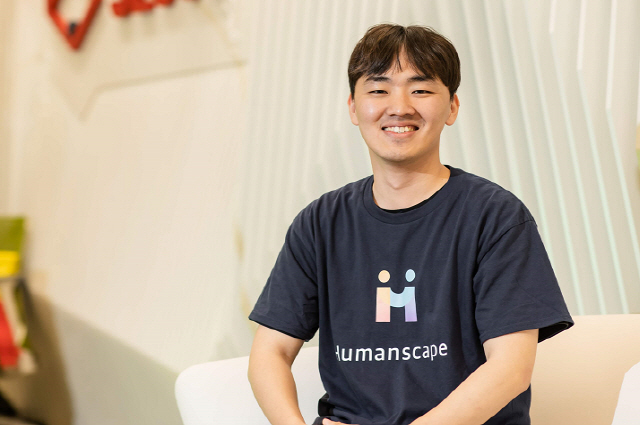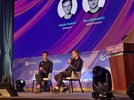
Have you ever heard of the term “patient journey?” This refers to a series of phases a patient goes through, from being aware of his or her symptoms to understanding illness and undergoing treatment. Humanscape CEO Jang Min-hoo says he will enable the “patient engagement journey” through DApps (decentralized applications), noting that “patients will be able to obtain information about relevant symptoms and learn to manage their illnesses whenever necessary.”
Humanscape joined Kakao’s blockchain platform Oct. 22 as the first DApp in the network’s healthcare and medical sector and commits itself to building a community DApp where the company collects information patients enter in person and pays tokens as reward to information providers. If patients post information on their conditions and symptoms in Humanscape’s blockchain community, healthcare professionals verify this. In this way, the company aims to create a community through which patients can satisfy desire for medical information without having to go to hospital.
Humanscape signed a memorandum of understanding with the Korean Foundation Fighting Blindness having 8,000 members in June. The following month, it conducted an initial coin offering (ICO) in Hong Kong and concluded a business pact with Medibloc, a medical blockchain platform. The company secured 3.5 billion won in Series A Investment from Kosdaq-listed healthcare company CareLabs and private equity funds. Humanscape’s spectacular growth is based on its existing experience in the market. It developed “Helen,” a mobile customer management service targeting small and mid-sized hospitals, in 2016 and has secured data of more than 10,000 patients, thereby accumulating experience in collecting and managing patient data.
Humanscape’s blockchain-based patient community is designed to offer substantial rewards to blockchain participants who type in their courses of treatment and provide information for the community. Jang cited “Patients Like Me,” a personalized health network in the U.S., which obliges all patients to agree to the terms and conditions: “All information shall be donated to other patients out of good faith.” “But the network collects information and sells it to medical institutions,” he said. The fact is that the company other than information providers monopolizes profits just because the profit-oriented entity collects information. “It’s no good if information providers and beneficiaries are different. In Humanscape, patients can get indemnities for the information they provide,” Jang said.
Humanscape also differs from other healthcare platforms in the kind of information collected. The blockchain network shares subjective symptoms patients feel themselves rather than those of doctors or hospital officials. According to Jang, 10% of medical information is clinical data written by doctors and 30% is genetic data. The remaining 60% is patient data that is a subjective record showing how seriously ill you are and how you are treated. It is the 60% that Humanscape sets its sight on. Jang said it was most difficult to win confidence from patients. “At first, we saw the patient community merely as the counterpart of a contract or the means of subscriber expansion, but it was the wrong approach,” he said, adding that “we’d like to offer our sincerity to the community by listening to patients closely and preparing systematically and professionally.”
Humanscape joined hands with Kakao’s blockchain platform Klaytn and became the network’s first partner representing the healthcare and medical sector. Jang said his company will cover a broad range of diseases and aim to launch the service in the first quarter of next year.
He also unveiled a plan to reach out to such regions as Southeast Asia where mobile services are prevalent but access to healthcare service is not good. Humanscape is ready to enter Indonesia in the second quarter of next year after launching its service domestically first. “Indonesia is beset with low medical services. Doctors there are rarely experienced because wealthy people routinely go abroad for treatment,” Jang said, noting that it would be very helpful to both patients and doctors if a community platform shows up to enable patients to provide information on their conditions and symptoms.
/Jaeyeon Won Reporter wonjaeyeon@decenter.kr
- 원재연 기자
- wonjaeyeon@decenter.kr























